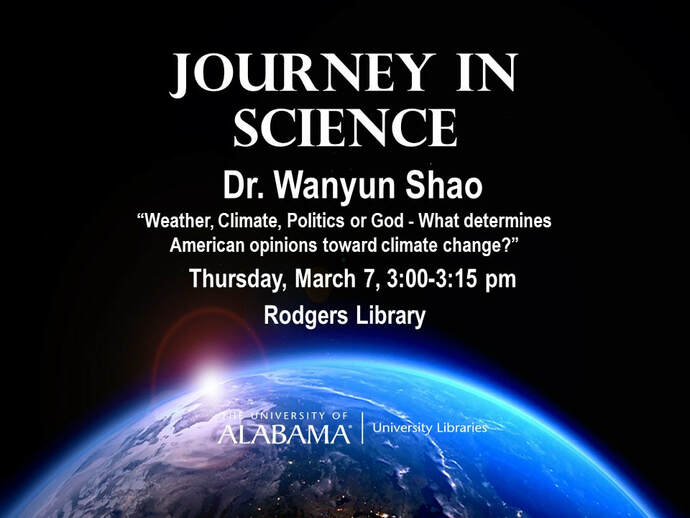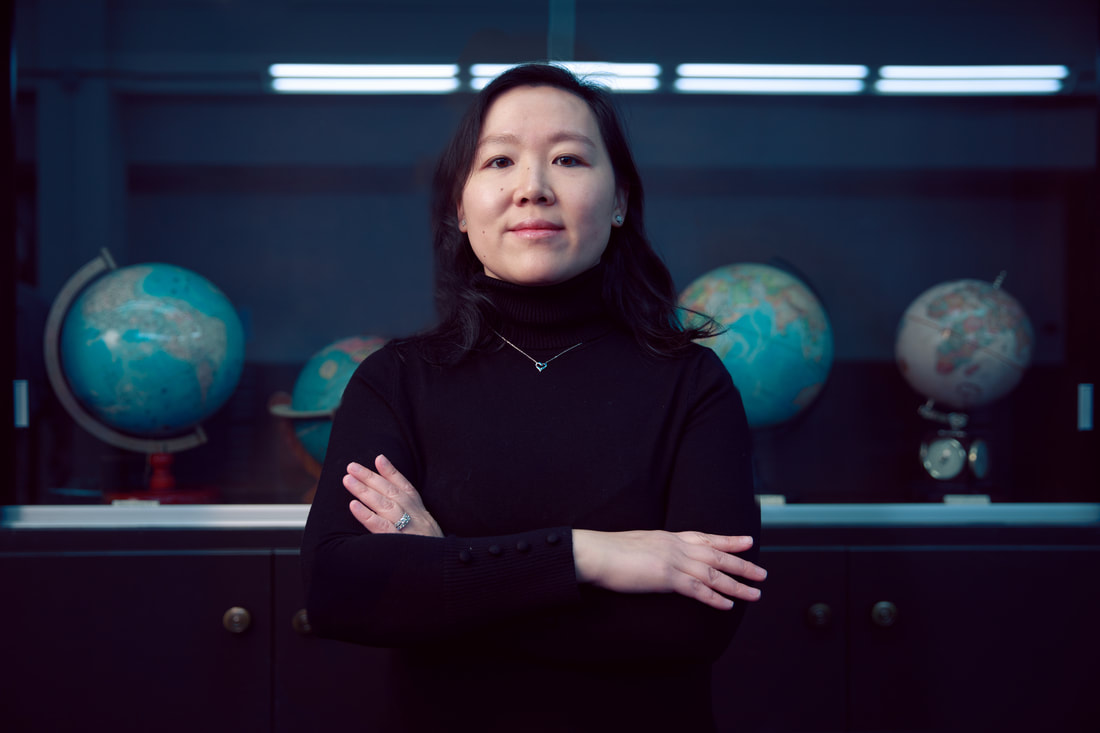|
Our new paper, entitled "Public awareness and perceptions of drought: A case study of two cities of Alabama" is published in Risk, Hazards, & Crisis in Public Policy. Below please find the abstract:
"Drought poses serious risks to society. There is, however, a lack of timely public awareness and sufficient public risk perceptions of this hazard due to its gradual onset. Timely and adequate public response is conducive to effective mitigation. It is imperative to understand how the public responds to drought. Using data from multiple sources, situated in two cities (Mobile and Huntsville) of Alabama, our study represents a comprehensive effort to understand public awareness and perceptions of drought. We have made several important findings. First, both physical and social contexts can influence public awareness of drought. Mobile is prone to a variety of coastal hazards and displays high social vulnerability. Residents in this city are thus more sensitive to environmental shocks, especially less frequent ones such as drought. Second, public awareness of drought is not constrained within the immediate drought impact area. Governmental declaration or regulation can bring the issue of drought from one area to the attention of the other area within one state. Third, public perceptions of drought numbers are negatively correlated with perceptions of precipitation but positively associated with perceptions of extreme heat. This finding reflects that the public perception of drought is in line with scientific understanding of drought. Drought is by definition persistent deficit of precipitation. Flash droughts can be triggered by heat waves which are more likely to occur during a drought. We end this study with recommendations for future studies."
0 Comments
10/13/2020 1 Comment My analysis article on the Conversation I just published one analysis article on the Conversation. Below please find the last section:
"Hope for shrinking the power of misinformation The success of slowing the spread of COVID-19 hinges largely on people taking precautions, particularly wearing face masks and social distancing, until a safe and effective vaccine is widely available. One study on attitudes toward climate change offers some hope. It found that a large number of Republicans and conservatives actually hold more unstable views about climate change over time. This instability may mean they could be more open to listening to the evidence and changing their minds. If this is also the case with COVID-19, strategic science communications and community engagement activities may be able to make a difference and stop the rising death toll." I have joined the International Editorial Board of Palgrave Communications (a Nature journal). I am an associate editor in the subject area of Geography and Demography.
Palgrave Communications is a fully open-access, online journal publishing peer-reviewed research across the full spectrum of the humanities and social sciences. Palgrave Communications welcomes the submission of in-depth interdisciplinary studies. I am featured in the NYT article by Brad Plumer. In this article, he explored how the weather gets weaponized in climate change messaging.
The 2019 Journey in Science series at Rodgers Library for Science & Engineering at the University of Alabama: I will give a lightening talk summarizing my past and recent research on the topic of American public opinion towards climate change. In this talk, I will discuss the various forces including both natural and socio-political ones that influence American opinion towards this critical issue.  While some federal agencies such as EPA and DOE are under increasing political scrutiny and pressure on their climate research and communication efforts, the National Academies of Sciences, Engineering, and Medicine as an independent entity is doubling down the effort to engage the public and decision makers on the scientific consensus of climate research. The Academies just launched a Climate Communications Initiative.
There has been a replication crisis in medical and psychological studies in recent years. This NYT piece documents a prime example in social psychology. At the center of the "drama" are Amy Cuddy whose TED presentation on power pose has attracted tens of millions of views on YouTube and several statistically savvy researchers including Andrew Gelman.
For many empirical scientists, using statistical analyses of a random sample to make inference for the entire population is the most reliable way to reveal some hidden patterns, except when a "pattern" already exists in the researcher's mind before even conducting the study. What the researcher needs to do is to find an ideal "path" to use the data to prove the preexisting pattern. This has been known as "p-hacking." (also read here, here, here,) Conducting research has never been easier. Scientists are "blessed" with so much data. With the blessing also comes a daunting task: correctly detecting signals from an expanding sea of noises. We empirical scientists thus have the obligation to constantly educate ourselves about the most recent advances in statistical methods. In the meantime, we need to constantly remind ourselves of putting aside our biases and wishful thinking while conducting research. Actions need to be taken at not only individual level but also collective level. Too much hype has been given to the so-called statistically significant findings. The glory of "statistical significance" has permeated the entire culture of science. Scientists are first and foremost humans who are driven by desires for success, fame, status, and respect. No one would pay much attention to a study that produces largely insignificant results. Maybe, incentives can be provided to researchers who after painstaking research design, meticulous data collection, and rigorous statistical tests end up with statistically insignificant results. I remember having an in-class discussion in graduate school. The professor told us that sometimes insignificant results can be meaningful too. Journal editors may want to give equal consideration to those rigorous studies that fail to produce significant results. While everyone is busy conducting original studies, incentives need to be provided to encourage replications. Only when we put checks and balances in place can we make this system more transparent and healthier. Scientists have started brainstorming about a path forward in the wake of the replication crisis. Some suggest, if P-hacking is such a rampant issue, why not make it harder to achieve significance? This Nature Human Behavior article proposes raising the bar by lowering the P-value threshold from 0.05 to 0.005. Before March for Science, there was a debate about whether politicizing science would jeopardize scientists' reputation for being objective in their scientific pursuits. Early evidence suggests that the march did drive liberals and conservatives further apart on their views towards scientists. Whereas, their views toward science (research scientists conduct) have remained immune to change by this kind of publicity.
The concern for politicizing science is not without legitimate reasons. The scale of issues like climate change transcends personal experience with the immediate environment. Public understanding of this kind of issues thus hings upon multiple information sources. Unfortunately, scientists' peer-review articles are quite elusive for laymen to digest and they often stay behind pay walls. The media and others try to bridge the scientific community and the public, with journalists and others taking on the responsibility of translating scientific findings for the mass. With the third party being involved, things can get even more complicated. For instance, one principle called "balance" commonly adopted in journalism is intended to project a "fair" and "objective" image (Boykoff and Boykoff 2004). Guided by this principle, journalists in practice would interview one scientist whose view represents the majority's and one scientist whose view reflects the minority's. By doing so, both are given equal time on the air or space on the paper. Through this process, any scientific consensus would be perceived as "unsettled" by the receiving end. Scientists are human beings and can make mistakes. The public trust in scientists is indeed found to be a powerful factor of converting knowledge about global warming into risk perceptions of this issue (Malka et al. 2009). My research demonstrates that people who believe that scientists make positive contribution to the well-being society are more likely to accept anthropogenic global warming (Shao et al. 2016). Scientists are also perceived to have their own political ideologies whether or not this is the case for each individual. One of the implications of accepting human-caused climate change is governmental intervention, which is more in line with liberal worldview. It is therefore not surprising to see some critics perceive that climate change is "exaggerated (at best) or manufactured (at worst) by liberal scientists to force environmental action on the American political system" (Shao et al. 2016, 8). We actually found that "individuals who perceive that scientists are liberal are less likely to perceive that global warming is generated by human activity. This is in keeping with the perception held by some individuals that scientists are an ideological liberal group and that their findings are tainted by ideological bias" (Shao et al. 2016, 15). Scientists really need to walk the fine line between pursuing scientific knowledge and helping the public understand scientific issues more accurately. If not done delicately enough, the public will dismiss scientists' work as "alternative facts." Reference Boykoff, M. T., and J. M. Boykoff. 2004. “Balance as Bias: Global Warming and the U.S. Prestige Press.” Global Environmental Change—Human and Policy Dimensions 14:125–36. Malka, A., J. A. Krosnick, and G. Langer. 2009. “The Association of Knowledge with Concern About Global Warming: Trusted Information Sources Shape Public Thinking.” Risk Analysis 29:633–47. Shao, W., Garand, J.C., Keim, B.D., Hamilton, L.C. 2016. "Science, scientists, and local weather: understanding mass perceptions of global warming." Social Science Quarterly. doi:10.1111/ssqu.12317 12/10/2016 0 Comments Scientists' petitionConfronted with the daunting challenge posed by climate change, the political climate seems to be on the path to drive the real climate even weirder. Over 800 earth scientists and energy experts have signed an open letter to the president-elect urging him to "take immediate and sustained action against human-caused climate change." Specifically, they suggested the president-elect take six steps:
"1. Make America a clean energy leader. 2. Reduce carbon pollution and America’s dependence on fossil fuels. 3. Enhance America’s climate preparedness and resilience. 4. Publicly acknowledge that climate change is a real, human-caused, and urgent threat. 5.Protect scientific integrity in policymaking. 6. Uphold America's commitment to the Paris Climate Agreement." |
|


 RSS Feed
RSS Feed